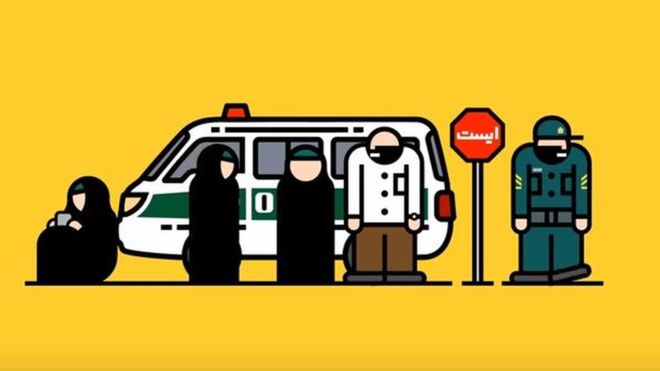An anonymous Iranian team of app developers have come up with a new smartphone application that helps Iranians dodge the Islamic Republic’s “morality police” known in Persian as “Ershad” or guidance. The app widely spread among young, tech-savvy population but has quickly fallen foul of the authorities.
The data for the Gershad app is crowdsourced. It depends on reports from users to help others being stopped at checkpoints set up by the morality police, who enforce Islamic dress and behavior codes. Users can tag their location on a Google map with an icon of a bearded man, enabling others to steer clear of them. When the number decreases, the alert will fade gradually from the map.
Gershad is a contraction of the full title of the Gashte Ershad (guidance patrol), which is part of efforts to eliminate Western culture from the country following the Islamic revolution which overthrew a Western-backed king in 1979.
Ershad’s notoriety comes out of their role to check for “immoral behavior”—women wearing too much makeup or failing to cover their heads, men too much influenced with Western fashion, or unmarried men and women traveling together are a few examples. The Ershad can issue warnings, demand formal written statements of “repentance,” or arrest and prosecute people at their discretion.
The app’s developers explained their motives in a statement on their web page saying: “Why do we have to be humiliated for our most obvious right which is the right to wear what we want? Social media networks and websites are full of footage and photos of innocent women who have been beaten up and dragged on the ground by the Ershad patrol agents.”
The app was blocked by the authorities soon after it was released for Android devices on Monday but many Iranians bypass Internet restrictions by using a Virtual Private Network.
It is already trending on social media and has received almost 800 reviews on the Google Play app store, nearly all of them positive, although Google Play does not show how many times Gershad had been downloaded.
Gershad is seen by some as a “social movement” setting a precedent for “digital protest” with Iranians turning to technology to evade checks on their everyday lives. This step has surfaced as elections in Iran come into view and the country emerges from years of isolation following the lifting of international sanctions imposed over its nuclear program.
“This is an innovative idea and I believe it will lead to many other creative apps which will address the gap between society and government in Iran,” said Hadi Ghaemi, executive director of the International Campaign for Human Rights in Iran.
Ghaemi said the app’s developers were based outside Iran but had grown up in the country and experienced the problem firsthand.
“It’s really an indigenous product… these are the kind of people who have been stopped at checkpoints,” he said.
“It’s showing a trend in digital protest… I see it as a precedent for future apps of its kind,” said Amir-Esmaeil Bozorgzadeh, a Dubai-based consultant for app makers in the Iranian market.
Smartphone messaging applications are popular among young Iranians who use apps to share news and jokes that would not be allowed in the tightly controlled traditional media.
Many Iranians, especially the young, are hoping that an easing of cultural restrictions follow the lifting of sanctions and the elections on Feb. 26.
However, so far, thousands of moderate and reformist candidates have been barred from standing in the elections.

